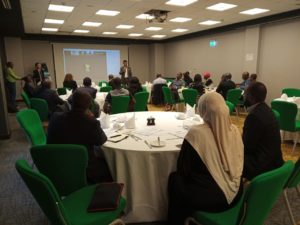Crescent Tech Limited held a breakfast meeting at Parkinn Hotel in Westlands on 22nd November 2018, to discuss key challenges facing the healthcare facilities in Kenya. Some of the key issues highlighted were: Limited access to health care facilities, lack of adequate personnel and expertise to address the medical needs, poor Infrastructure where most facilities do not have the proper facilities to handle the medical challenges, ironically the facilities that are highly equipped with specialized equipment do not have effective processes and personnel in place to execute the tasks, access to medical records and Healthcare Financing.
The breakfast meeting was organized by Crescent Tech Limited and Napier Healthcare who partnered so as to address these issues of access to healthcare services and also to offer solutions that will provide a seamless access to records and efficient delivery of services to even the most rural area in the country.

For a healthcare facility to deliver quality healthcare, it should be well equipped with the right equipment and tools, quality medications, should be accredited, should have qualified and experienced staffs. In Kenya, the healthcare sector is facing some setbacks in: supply chain, the facilities are understaffed, healthcare financing and innovations & technology. Once this set backs are looked into, the delivery of quality healthcare will go a notch higher.
In his opening statement, Dr. Percy narrated a direct experience of how the above mentioned challenges impacted and eventually led to the loss of their C.E.O, the late Mr. Kennedy Mbwaya, who was in urgent need of medical attention while in Eldoret for a business meeting. Thereafter, the ambulances services arrived late, and it was a challenge identifying a center that could perform an endoscopy. When that was established, an appointment was required to be made so as to access the services of a specialist. This whole process greatly affected the speed at which his life could have been saved.
According to Dr. Amit N. Thakker, Chairman Kenya Healthcare Federation, the new constitution that brought forth the two arms of government, National and devolved governments gave capital to projects aimed towards the BIG 4 agenda, healthcare being one of them, through the Constituency Development Fund(CDF).Under financing of the health sector, our government has reduced its funding and this has posed as a challenge in the health sector. Over 80% of the country’s population is dependent on this funding for their healthcare needs. A very small percentage of Kenyans have access to private insurance and can afford to pay for their own healthcare expenses. This is less than 20% of the Kenyan population.
“Kenya has undergone quite some positive disruptive changes in governance and through the devolution of some services from the national government to the county government. As expected, this transition has encountered its challenges. In as much as we consider our country as having highly skilled specialized staff, we still do not have available workers to provide for healthcare services to the larger population. The people who mostly need these services, still have challenges accessing the services of specialized health workers to assist them. There is an urgent need to address this human resource and staffing issue through a proper policy in place that will boost the public health sector.” Dr. Amit N. Thakker, Chairman Kenya Healthcare Federation.
Recommendations towards solving the challenges as discussed in the meeting were: The general challenge of leadership and governance has trickled down to the health care sector. Allocation of resources has been hampered by poor governance and the lack of accountability in the use of the resources allocated to the healthcare sector therefore, the Government should accelerate discussions and implementation of public-private partnership initiatives for creation of sustainable models for healthcare financing to achieve Universal Health Coverage.
“Since Africa is emerging as an economic hub, it is notable that there is a great need to embrace technology in the key sectors like health care. Napier healthcare comes in handy with relevant solutions for the healthcare sector as it has technology that was designed by a team of doctors based in Singapore. Singapore is a proper case study for Kenya as both countries were colonies of Britain and in 1979 both economies were at par. Bloomberg ranked Singapore’s healthcare system the most efficient in the world in 2014. The Economist Intelligence Unit placed Singapore second out of 166 countries for health-care outcomes.” Enrico Lim, Regional Alliance Director, Napier Healthcare.

3 thoughts on “Challenges in Kenya’s healthcare systems”
The above writing was outstanding. I find it very remarkable and I will certainly forward this to my buddies on the world wide web. Anyway, thank you for sharing this.
Hey! I just noticed one other message in one other weblog that regarded like this. How are you aware all these items? That’s one cool post.
It is a fantastic post; it had been exceptionally informative. I appearance forward in examining significantly more of ones function. Also, I produced confident to bookmark your internet site so I can come back later